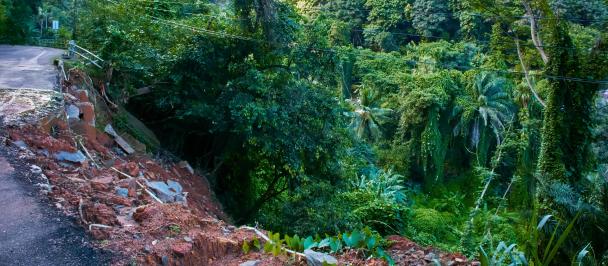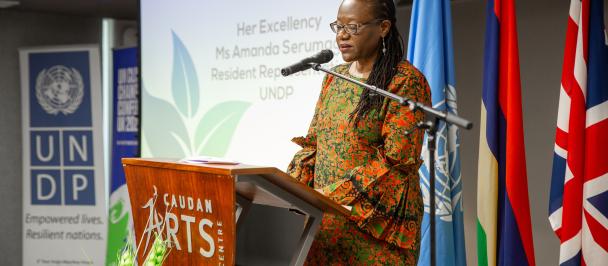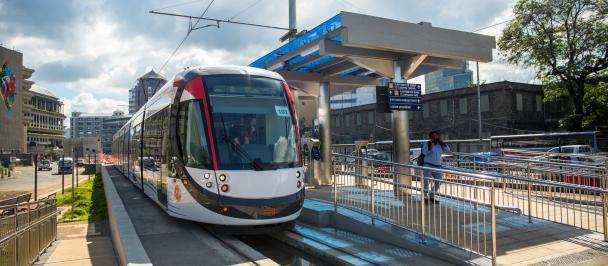Her Excellency Ms. Amanda Serumaga, UNDP Resident Representative for UNDP Mauritius and Seychelles, addressing the audience at the Inauguration of the 14 MW Grid-Scale Battery Energy Storage System at CEB Jin Fei sub-station, Riche Terre.
16 December 2021
Honourable Lesjongard, Minister of Energy and Public Utilities Ms Guness-Goolbar, Permanent Secretary, Ministry of Energy and Public Utilities
Mr Bonomaully, Director Economic and Finance (Public Infrastructure), Ministry of Finance, Economic Planning and Development and National Project Director for the GCF project
Mr. Pouilles-Duplaix, Director, Agence Francaise de Développement
Mr Chellapermal, Chairman of the Central Electricity Board Mr Donat, General Manager of the Central Electricity Board
Mr Dabeedin, Manager, Renewable Energy and Strategic Projects, Central Electricity Board and National Project Director for Component 2 of GCF project
Distinguished Guests,
Ladies and gentlemen,
A very good morning to all of you.
I am pleased to take part this morning in the inauguration event for the 14 megawatts battery energy storage system of which 4 megawatts are installed and operational here at the CEB Jin Fei sub- station.
The UNDP, with the financial support of the Green Climate Fund has contributed to the installation of a total of 18 megawatt of utility- scale, battery-based energy storage systems which are now up and running at six CEB sub-stations around the island of Mauritius with a first set of 4MW commissioned in 2018. Approximately USD 10 million of grant funding was allocated from the GCF through the UNDP for the overall initiative. A 1.5-megawatt system installed at the Pointe Meunier sub-station in Rodrigues Island and is also partly financed by UNDP – GCF partnership.
I wish to congratulate the Ministry of Energy and Public Utilities and the Central Electricity Board for driving the decarbonisation process of the electricity sector and for ensuring that installation of the 14MW battery system, initiated in late 2019, was successfully completed despite the challenges caused by the Covid pandemic.
Altogether, the 18-megawatt battery energy storage support will help to strengthen and stabilize the national electricity grid in view of incorporating more renewable sources of energy, especially those of highly intermittent nature such as solar and wind.
This is an essential requirement to enable the country to attain the 60% renewable energy target by 2030. In this respect, the Government of Mauritius is highly commended for committing to more ambitious targets, and putting in place the necessary legal and regulatory frameworks for a conducive investment environment in the green energy sector in Mauritius.
Ladies and gentlemen, the UNDP Mauritius Country Office has been a committed development partner extending technical and financial support to the country in its effort to attain the Nationally Determined Contribution (NDC).
Indeed starting 2009, the Mauritius Country Office provided technical assistance for the development of a national grid code for small scale distributed generation from renewable energy sources. This really was foundational to democratising and opening up the market to small-scale energy producers such as small and medium enterprises and individuals.
UNDP next supported government to secure a USD 2m grant from the Global Environmental Facility in 2011 to further consolidate the regulatory framework for renewable energy and de-risk the sector for increased investment.
Building on this project, UNDP Mauritius in partnership with the Government secured a 28 million USD grant from the Green Climate Fund in 2016 to further assist in overcoming identified barriers to low-carbon investment including further institutional strengthening for renewable energy and improving grid absorption capacity, notably through the use of battery energy storage systems. The GCF resources also supported the training of more than 50 CEB technicians on the new battery technology.
More recently, and in line with our mandate of eradicating poverty while protecting the planet, UNDP with the support of the MARENA, the Australian and British governments is supporting the training of women and youth on renewable energy.
Ladies and gentlemen, the UNDP-supported, Green Climate Fund-financed ‘Accelerating the Transformation Shift to a low carbon economy in the Republic of Mauritius’ project which is currently being implemented by government also aims to democratize access to consumer-based solar powered electricity generation.
We are currently awaiting confirmation from the GCF to enable the project to progress to Phase II following successful completion of Phase I. It is expected that In the second phase of the GCF project approximately 13.5 million USD will be made available to beneficiaries in the form of a 27% grant towards the cost of installation of rooftop solar PV systems.
A total of 25 megawatt of such systems will be deployed across three main categories: 1) low- and middle-income households, 2) NGO’s and 3) public buildings including educational institutions. This will enable low- and middle-income families, public entities and NGO’s, to reduce their electricity bills whilst contributing to the decarbonisation efforts. I am made to understand that the CEB, the implementing partner for the Phase II deployment, is currently in the process of finalizing the relevant renewable energy schemes under each category in preparation for Phase II of the project, with support from the UNDP project team.
The 18-megawatt BESS will ensure that the 25 megawatt of distributed PV systems, alongside the other upcoming renewable energy projects, are smoothly integrated on the national grid.
Ladies and gentlemen, very recently at the COP26 World Leaders Summit, the UN Secretary-General, António Guterres, reminded us that the six years since the Paris Climate Agreement have been the six hottest years on record and that our addiction to fossil fuels is pushing humanity to the brink with small island developing states being the first victims of climate change. There is, therefore, an urgent need to shift to low carbon economic model to keep the goal of 1.5 degrees Celsius alive.
Meeting the national and global clean energy targets and addressing the challenges associated with climate change will not be possible without the necessary technological setups and upgrades such as the battery energy storage system. In this respect, the CEB has to be congratulated for future-proofing the electricity generation, distribution and transmission components especially in view of integrating more renewable energy sources.
I also wish to thank the Ministry of Energy and Public Utilities, and the government of Mauritius, for championing those laudable initiatives. The UNDP Country Office remains a committed partner throughout this challenging but hugely gratifying journey towards greening the country and its economy.
Thank you for your kind attention.

 Locations
Locations



